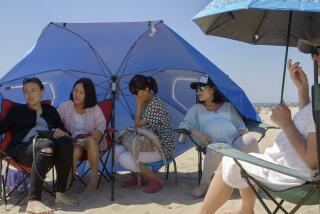And baby remakes three
- Share via
MIANZHU, CHINA — Ten months and 25 days after he buried his only child, Luo Gang became a father again at a makeshift hospital cobbled out of aluminum trailers.
For weeks after his 11-year-old daughter was killed in last May’s massive earthquake here in Sichuan province, his wife cried so uncontrollably that her family feared she might be having a breakdown.
“If you don’t have another baby, my sister will be grieving her whole life,” Luo said his brother-in-law advised him.
Luo said he was shocked by the tactlessness of the suggestion.
“We were in a bad way after the earthquake. My wife couldn’t stop crying,” recalled Luo, a 35-year-old welder, his eyes sunken deep with fatigue after a long night waiting for his wife to give birth to their son. He spoke outside the hospital room where his perfect little baby, born a few hours before, lay wrapped in bunting in a metal bassinet next to his mother, both sleeping contentedly.
“Now, we are better. A new life has been created to take the place of the one that was taken away.”
To say that survivors of the May 12 earthquake, which killed an estimated 70,000 people, are recovering would be premature, given that many are still living in tents and searching for the remains of their loved ones.
But thousands of couples in their 30s and 40s, most of whom lost their only children, have decided they cannot afford to wait.
The result is a bittersweet baby boom, the joy of each birth tempered by the rawness of the recent loss.
“Chinese people are very practical,” said a maternity nurse at the Mianzhu City Hospital. The nurse, who did not wish to be quoted by name, said that eight of the 70 mothers in the maternity ward had lost children in the earthquake.
Nobody likes to use the term “replacement baby,” which sounds callous, but many of the newborns in Sichuan wouldn’t exist if not for the deaths of their siblings in the earthquake, given China’s one-child policy.
In Mianzhu, 50 women who lost children in the quake have given birth and 400 are pregnant, said Song Tao, director of family planning for the town.
Family planning officials, who enforce the limits on family size, are encouraging couples who lost their only child to have another. The government is paying for fertility counseling, operations to reverse vasectomies and tubal ligations, as well as removals of intrauterine devices, the most common form of birth control in China.
The motives are not purely humanitarian. The government needs to quell resentment over its unpopular limits on family size. Sichuan has long been a battleground over the policy, with the government strictly enforcing the one-child limit. (In many other parts of China, farmers can have a second child if the first is a girl, but not in Sichuan.)
Among Sichuan’s predominantly rural population, most people have no retirement plans other than the long-ingrained Chinese tradition that children care for their elders.
“The earthquake very much highlights the vulnerability of the one-child policy,” said Gu Baochang, a professor of demographics at People’s University in Beijing.
“These people are not covered by any social security program. They rely completely on their children for elderly support. And it’s not just money. Once they are old, without children they have no place in society.”
It might sound calculating, but the death of a child is an economic as well as emotional catastrophe for many Chinese couples.
“We spent all our money on our child. The money is gone. The child is gone,” said Liu Shengying, 39, whose 18-year-old daughter died with most of her classmates when her school collapsed. A few months after the earthquake, Liu had her IUD removed and her husband had surgery for a prostate condition. She is now five months into a difficult pregnancy.
“I can’t say that I feel good about this pregnancy,” said Liu, her rough hands running along the pink cable-knit sweater stretching over her belly. “By the time this baby is grown up, we will be old. We won’t be able to retire until then.”
Liu estimates that 40% of the mothers of her daughter’s classmates are also pregnant.
Among rural Chinese, it is unusual for women older than 35 to have babies, and the rush to replace children killed in the earthquake has raised new complications.
Rural Chinese women on average enter menopause about five years earlier than Westerners because of lifestyle, genetic and dietary factors, said Wang Yijue, director of the Sichuan Reproductive Health Research Center, which has treated about 100 parents of earthquake victims.
When she began seeing such patients last summer, Wang says, she discovered that more than half of the mothers had stopped menstruating because of the stress and depression resulting from the earthquake.
“One thing we learned from this experience is not to downplay the psychological factors that affect pregnancy. Under circumstances where the parents are suffering from such deep sadness, there are many problems we wouldn’t have anticipated,” Wang said.
She said the women also have suffered larger than normal rates of miscarriage.
Even with the successful pregnancies, the prospective parents describe a tangle of emotions, mostly guilt and anxiety. Will the baby live up to the memory of the child they lost? Will they be able to love the new child as much? Will they tell the new child that he or she exists only because their older child has died?
“When I try to think about the new baby, it reminds me of my dead daughters, and that is so painful,” said Qiu Guangrong, who is eight months pregnant and who lost a 6-year-old and a 1-year-old in the earthquake. (As a member of the Qiang minority, she was permitted to have two children.) She and her husband will try to pick a name for the newborn that commemorates the children they lost.
At the hospital, even as Luo Gang’s eyes sparkle when he speaks of the baby, he averts his face at the mention of his daughter, Huilin. His voice betrays a hint of a quaver when he tells how she delighted in cooking breakfast for her parents.
“Wake up, Daddy. It’s time for work,” Luo remembered her telling him.
Her mother, Zhang Anhui, pulled the 11-year-old alive from the wreckage of the Hanwang Central Primary School, but she died the next morning of internal injuries.
On April 7, the couple’s baby, Junjie, was born -- 2 1/2 weeks before his due date, but just in time for a new beginning.
--
Eliot Gao and Nicole Liu of The Times’ Beijing Bureau contributed to this report.
More to Read
Sign up for Essential California
The most important California stories and recommendations in your inbox every morning.
You may occasionally receive promotional content from the Los Angeles Times.










